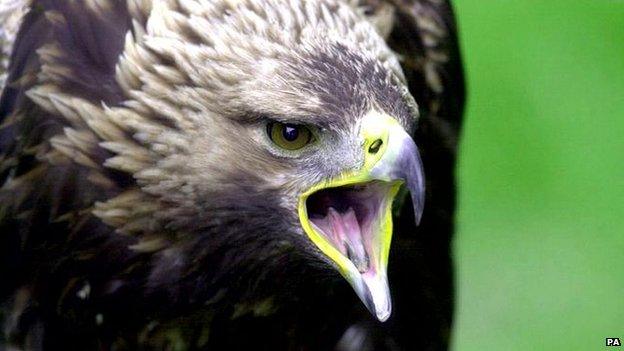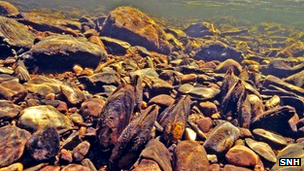Fewer birds of prey poisoned, but other persecution up
- Published

A golden eagle - and two buzzards - were victims of poisoning in 2012
The number of Scotland's birds of prey illegally poisoned has fallen dramatically, a report has said.
In 2012 a new group, the Partnership for Action Against Wildlife Crime (PAW) recorded just three incidents compared to 30 three years earlier.
But PAW said other forms of persecutions, such as egg theft, trapping and shooting remained high.
Its first annual report , externalon the extent of wildlife crime in Scotland, drawing on key data from a number of sources.
These included figures obtained from the Scottish government, the Crown Office and Procurator Fiscal Service, Police Scotland and the National Wildlife Crime Unit.
It is hoped subsequent reports will provide a clearer picture of trends in wildlife crime in Scotland and help guide future action.
Golden eagle
The report revealed one golden eagle and two buzzards were confirmed as poisoned in 2012.
In 2009 there were a total of 30 birds poisoned - 22 buzzards, four red kites two golden eagles and a sea eagle.
Other raptor crimes in 2012 included ten offences of nest disturbance, egg and chick theft as well as shooting and trapping.
The report said: "It is acknowledged that there may be other incidents where raptor persecution was suspected but there was insufficient evidence to record a crime.
"As with many other types of wildlife crime, these incidents often take place in remote locations where detection is difficult; therefore some incidents may remain unreported."
The Scottish Environment Minister, Paul Wheelhouse welcomed the report which he said was an important milestone in bringing together data to help combat wildlife crime.
He said: "We must not forget that underlying each and every statistic many of the wildlife offences highlighted entail great cruelty and suffering."
Pearl mussels

Freshwater mussel colony in Perthshire suffered serious pollution
The report details other instances of wildlife crime recorded in Scotland.
They include:
A man fined £160 in Dumfries & Galloway after an injured badger was found hanging from a fence by a snare. The animal recovered after treatment.
An Aberdeen man fined £160 for killing a pipistrelle bat flying outside a pub.
A construction company fined £15,000 for polluting the River Lyon in Perthshire, killing an important colony of freshwater mussels. It is not known if the pearl mussel population will recover.
A wide range of legislation was used to prosecute wildlife offences in 2011-12, including the Game (Scotland) Act of 1772.
In all there were 72 cases brought before the courts, resulting in 49 convictions.
Police Scotland has increased the number of Wildlife Crime Liaison Officers (WCLOs), and claimed this has already paid dividends.
Assistant Chief Constable Malcolm Graham said: "Police Scotland is committed to ensuring that wildlife crime is tackled effectively and that those who cause harm and damage to our environment are brought to justice.
"The new wildlife crime policing structures are complemented by a real enthusiasm amongst WCLOs to make a significant impact on this unacceptable form of criminality and to work in close harmony with those other agencies with which we have a joint responsibility to protect the natural assets of Scotland."